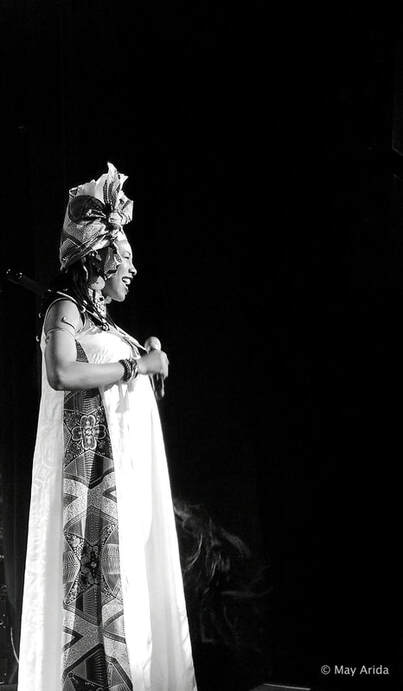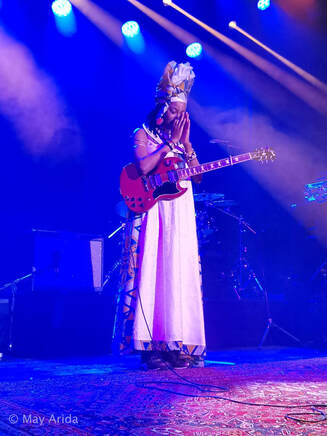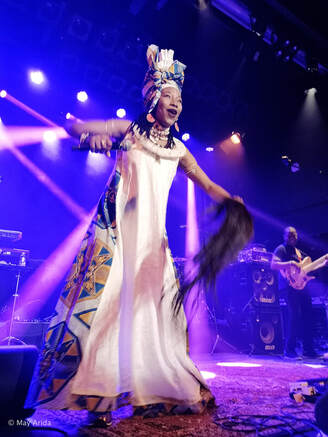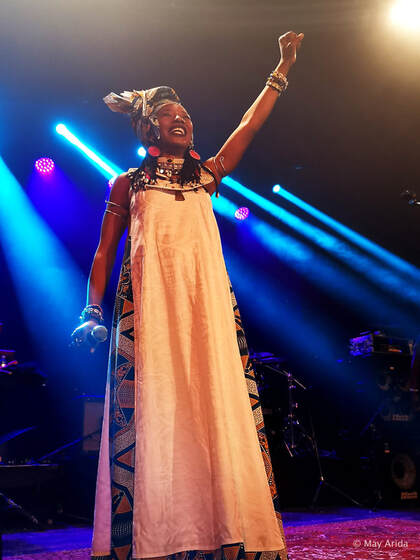Menu
|
Photos by May Arida  At the end of the film "Sia - the dream of the Python”, Sia confronts the new king, undresses herself and storms bare-chested out of the palace. She then time travels and in the next scene you see Sia walking in the streets of Ouagadougou where she demonstrates against tyranny all by herself. The main part in Sia is played by Fatoumata Diawara. It is a fictional story, but the persona in the film also carries quite a lot of Fatoumata Diawara character traits: fierce, unapologetic and authentic. As a child and as a teenager Fatoumata didn’t have an easy life. Growing up in difficult family circumstances, first in Ivory Coast and then in Mali, she had to fight to survive, against the tyranny of a family and a traditional society that had earmarked her for a different role in life. At the age of twenty Fatoumata Diawara ran away from home and joined a French theater troupe. "If I had that slip by," Fatoumata once said in an interview, "I wouldn’t be here today. I’d have minimum nine children and be very, very old (Fatoumata is 37 years old). My breasts would already be sagging and I wouldn’t have a job because I don’t have diplomas.” Tonight Fatoumata Diawara takes the stage of the Kaufleuten in Zurich. In the meantime she is no longer just an actress, but has also become a musician; she writes her own songs, plays the electric guitar and tours the world non-stop. It is a sunny Sunday evening in Zurich, you could also take a walk by the lakeside or have a barbecue in the garden, but the Kaufleuten concert venue is full. It is a mixed crowd that is waiting for Fatoumata, multi gender, multi age and multi ethno. Do they know what is in store for them? Can the audience anticipate that it is about to experience the greatest show that one can imagine as a concertgoer, with a personality - a woman, an artist - whose energy and presence on stage are second to none? Fatoumata Diawara doesn’t need to sing love songs because she herself is love. And then Fatoumata Diawara enters the stage. She is tall, she is beautiful, she starts to sing and to play, from Mali, from Africa, actually from all of us. For we are one planet, one humanity, one heartbeat, says Fatoumata, and the collective love that we derive from it makes it happen that by the third song already everybody in the house claps, dances and feels happy. Words are important to Fatoumata Diawara, however only very few in the public understand the lyrics of her songs word for word. Fatoumata sings in Bambara, a language from Mali. But she speaks with the eyes, with her voice; she talks with her gestures and with her body, and everyone knows what she means. Fatoumata Diawara wails, she jubilates, she accelerates and then slows down the pace again. It’s like a ride on the roller coaster of life where at the end the comfort of human warmth and the laughter of love await. I had hoped to interview Fatoumata Diawara before her concert in Zurich but her management shielded her from any requests because she needed to rest and to refuel before her "never ending world tour" continues. Experiencing her performance this evening, I understand why. Fatoumata goes all in when she's on stage. She has just been exhaustively touring in the USA, Canada and Spain, and after Zurich she will play in France and at the big festivals in Glastonbury and Montreux.
I would have wanted to know from Fatoumata Diawara how she, who speaks a lot about her responsibility towards Africa and the Africans, can handle this responsibility. Is it not too much for her at times and too heavy a load? It seems like she wants to save all of Africa on her own and counteract the rampant afro-pessimism (the Africans are muddling through and it's never getting any better) with a robust self-confidence that advocates specific African values and a self-responsible attitude to shape the continent. "Let's talk about the new Africa," says Fatoumata, the spokeswoman for a better Africa, in Zurich. "Many positive things happen with the new generation.” I also wanted to ask Fatoumata Diawara how she reconciles her two vocations, activist and artist. Can one say that her music embodies the artist Fatoumata and the lyrics her activism? How does she manage to find the right dose for both the fun and the serious? Incidentally, this dual role is not unknown in the culture of Mali. Already the early hunters - activists, if you will - became artists after a successful hunt and picked up an instrument to sing their own praises.  Self-evidently Fatoumata Diawara doesn’t sing her own praises. She doesn’t have to and she is way too smart for that. The rifle of yesterday's hunters has become Fatoumata's guitar of today. Just like her idol Fela Kuti, the Nigerian musical activist who invented the Afrobeat, a mixture of American funk and traditional African rhythms, often paired with provocative lyrics critical of the ones in power. In her repertoire Fatoumata Diawara has a song Fela-Kuti-style as well. When she performs “Negue Negue” (let’s have fun) from her current album “Fenfo”, Zurich goes through the roof. There is no more holding back; Fatoumata is grooving, the bass is booming, the audience is going wild. “We are having fun,” she sings, “it is what makes this world a better place to live in.” Fatoumata was not programmed for fun when she was born. Consequently she began her career as a musician writing and singing protest songs. "That's what I can do," she said in an interview for Afropop worldwide. "I can’t sing love. I can’t sing lightly." Fatoumata Diawara doesn’t need to sing love songs because she herself is love. She is love for the music, love for the people and the light on her face radiates and warms and brightens up even the last spectator in the darkest corner at the rear end of Kaufleuten. I am your sister and you are my sisters and brothers, says Fatoumata. We all want to hug ourselves and Fatoumata first and most strongly. Fatoumata is fantastic, Africa is fantastic, music is fantastic, we are one life and one love. We are one with Fatoumata Diawara.
1 Comment
|
EditorKurt is based in Bern and Beirut is his second home. Always looking for that special angle, he digs deep into people, their stories and creations, with a sweet spot for music. Archives
September 2020
Categories
All
I'd love to discover you. Share your creations here.
|




 RSS Feed
RSS Feed
